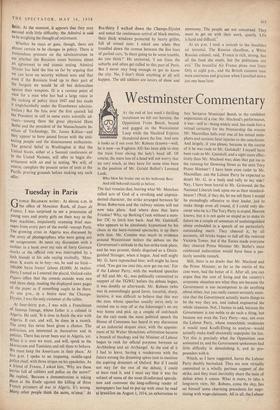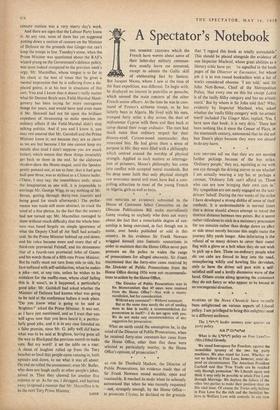Westminster Commentary
Who blew his brains out on his bedroom floor And still behaved exactly as before.
The fact remains that, barring what Mr. Mencken called acts of God of a revolting and unprece- dented character, the strike arranged between Sir Brian Robertson and the railway unions will not now take place. And where does that leave Frankie? Why, up Barking Creek without a num- ber 23C to fetch him back. And Mr. Gaitskell, who appears to be absolutely hypnotised by his chum in the horn-rimmed spectacles, is up there with him. Mr. Cousins was much in evidence around Westminster before the debate on the Government's attitude to the bus strike took place, and he was present, thinly disguised as a Distin- guished Stranger, when it began. And well might Mr. G. have reproached him; well might he have cried, 'You got me into this, now get me out.' For if the Labour Party, with the weekend speeches of Alf and Mr. G., was politically committed to support of the TGWU before the debate began, it was doubly so afterwards. Mr. Robens (who was in astonishingly good form; forceful, sharp, incisive, it was difficult to believe that this was the man whose speeches usually serve only to remind me to stop off at the fishmonger's on my way home and pick up a couple of cod-heads for the cat) made the most political speech the House of Commons has heard in any discussion of an industrial dispute since, with the appoint- ment of Sir Walter Monckton, arbitration became a branch of theology and the Minister of Labour began to rank for official purposes between an Archbishop and an Archangel. At the end of it I had to leave, having a rendezvous with the future among the dreaming spires (not to mention the aspiring dreamers of Oxford. But if I could not stay for the rest of the debate, I could at least read it, and I must say that it was the subject of some of the most ill-informed specula- tion and comment the long-suffering reader of newspapers has had to put up with since he read at breakfast on August 1, 1914, an exhortation to buy Sarajevo Municipal Bonds in the confident expectation of a rise. Mr. Macleod's performance, it was—still is—being widely said, has made him a virtual certainty for the Premiership the minute Mr. Macmillan falls over one of his mixed meta- phors and sustains fatal injuries to the catachresis. And largely, if you please, because in the course of it he was rude to Mr. Gaitskell! I myself have been rude to Mr. Gaitskell, and a sight more effec- tively than Mr. Macleod was; does that put me in the running for Downing Street as the next Tory Prime Minister? I have been even ruder to Mr. Macmillan; can the Labour Party be expected to desert Mr. G. in a body and rally to my side? Nay, I have been horrid to Mr. Grimond; do the National Liberals look upon me as their standard- bearer? (Well, if they do, let me tell them I would be exceedingly offensive to their leader, just to make things even all round, if I could only dis- cover who he is.) The Tory Party is stupid, Heaven knows; but it is not quite so stupid as to stake its future on a couple of sentences of undistinguished abuse embedded in a speech of no particularly outstanding merit. They cheered it, by all accounts, till bricks began to fall off the restored Victoria Tower, but if the Tories made everyone they cheered Prime Minister Mr. Butler's most celebrated indiscretion would have been a per- fectly sensible remark.
Still, there is no doubt that Mr. Macleod and the Prime Minister, as far as the merits of the case went, had the better of it. After all, you can argue that the cost of living and the country's economic situation are what they are because the Government is too incompetent to do anything about either, but you really cannot seriously main- tain that the Government actually wants things to be the way they are, and indeed engineered the whole situation. Not, I hasten to add, because the Government is too noble to do such a thing, but because not even the Tory Party—nay, not even the Labour Party, whose masochistic tendencies it would need Krafft-Ebing to analyse—would actually make itself electorally unpopular for fun. Yet this is precisely what the Opposition case ambunted to, and the Government spokesmen had little difficulty in demolishing it, and its pro- pounders with it.
Which, as I have suggested, leaves the Labour Party doubly becreeked. They are now virtually committed to a wholly partisan support of the strike, and they must inevitably share the taste of defeat when it comes. What is more, to take a long-term view, Mr. Robens, come the day, has set himself some charming precedents for nego- tiating with wage-claimants. All in all, the,Labour censure motion was a very merry day's work.
And there are signs that the Labour Party know it. At any rate, none of them has yet suggested putting down a motion of censure on the Minister of Defence on the grounds that Ginger-nut can't keep the troops in line. Tuesday's scene, when the Prime Minister was questioned about the RAF's wizard prang on the Government's defence policy, was tame indeed compared to the previous week's orgy. Mr. Macmillan, whose tongue is so far in his cheek at the best of times that he gives a mental impression that he is suffering from a dis- placed goitre, is at his best in situations of this sort. You and I know that it doesn't really matter what Sir Dermot Boyle says; Field-Marshal Mont- gomery has been saying far more outrageous things for years, and would have said even more if Mr. Shinwell had not hit upon the brilliant expedient of threatening to make speeches on military affairs if the Field-Marshal didn't stop talking politics. And if you and I know it, you may rest assured that Mr. Gaitskell and the Prime Minister know it; not because they are as clever as we are but because I for one cannot keep my mouth shut (and I don't suppose you are much better), which means that these things invariably get back to them in the end. So the elaborate shadow-show the House staged, until the Speaker gently pointed out, at ten to four, that it had gone half-past three, was as stylised as a Chinese ballet. (There, 1 may say, the resemblance ends; strain the imagination as one will, it is impossible to envisage Mr. George Wigg, to say nothing of Mr. Bevan, getting through thirty-two foilerres and being good for much afterwards.) The perfor- mance was made still more abstract, to crack the wind of a fine phrase, by the fact that the scenery had not turned up; Mr. Macmillan managed to show without much difficulty that the whole busi- ness was based largely on simple ignorance of what the Deputy Chief of Air Staff had actually said. So the Prime Minister bobbed up and down, and his voice became more and more that of a third-rate provincial Falstaff, and his demeanour that of a fourth-rate provincial John of Gaunt, and his words those of a fifth-rate Prime Minister. But he really must not turn from side to side, his face suffused with self-satisfaction, when he makes a joke—not, at any rate, unless he wishes to be mistaken for the muffin-man, whose chief failing this is. It wasn't, as it happened, a particularly good joke; Mr. Gaitskell had asked whether the Minister of Defence had known what was going to be said at the conference before it took place.
• Do you know what is going to be said at Brighton?' asked the Prime Minister. It was not, as I have just mentioned, and as I trust that you will agree now that you have heard it, a particu- larly good joke, and it is in any case founded on a false premiss, since Mr. G. jolly well did know what was to be said at Brighton, having gone all the way to Blackpool the previous month to make sure. But my word! it set the table on a roar. A shout of laughter rolled up from the Tory benches so loud that people came running in, both upstairs and down, to see what it was all about. On and on rolled the amusement; even Mr. Butler, who does not laugh easily at other people's jokes, joined in. Then they cheered for another five minutes or so. As for me, I shrugged, and hurried away to spread a rumour that Mr. Macmillan is to be the next Tory Prime Minister.
TAPER



































 Previous page
Previous page